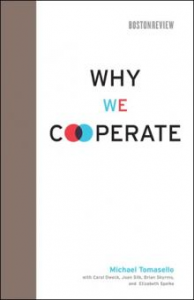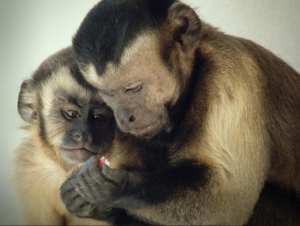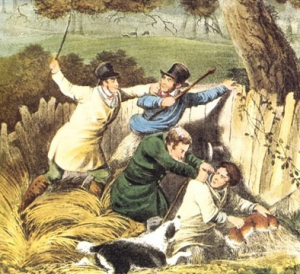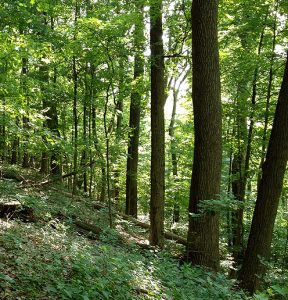The phrase leaped out at me—from the pages of Scientific American, no less. Martin Nowak, a mathematician, biologist, and director of a program in evolutionary theory at Harvard, was arguing that cooperation, not just competition, advances evolution. In Nowak’s words:
Life is therefore not just a struggle for survival—it is also, one might say, a snuggle for survival.

Nowak applied the mathematics of game theory to digital models of evolution and discovered cooperation exerting more influence than expected. His conclusions challenged decades of thinking about how nature operates.
“Red in tooth and claw” was Tennyson’s way of summing it up. It’s a phrase so familiar today as to appear self-evident. Most people assume—and it has been scientific dogma since Darwin—that evolution advances by way of competition between organisms.
Another look at cooperation
Nowak is far from the only scientist concluding that cooperation plays a far bigger evolutionary role than previously thought.  Psychologist Michael Tomasello, codirector of the Max Planck Institute for Evolutionary Anthropology in Leipzig, showed in his 2009 book, Why We Cooperate, that children prefer cooperative behavior even at ages too young to have been taught it. The human temperament comes with cooperation built right in.
Psychologist Michael Tomasello, codirector of the Max Planck Institute for Evolutionary Anthropology in Leipzig, showed in his 2009 book, Why We Cooperate, that children prefer cooperative behavior even at ages too young to have been taught it. The human temperament comes with cooperation built right in.
In 2012 scientists at Trinity College, Dublin, applied game theory to the question of how humans developed big brains and discovered something totally unexpected: in their models, larger brain sizes and greater intelligence were driven by teamwork and cooperation more than competition.
And only a couple months ago Swiss and Russian ecologists confirmed that in their studies, avoiding competition rather than engaging in it led to the evolution of diversity, both in their digital model and in actual fish populations. The results were strong enough for them to conclude that
competition and a struggle for the existence are not the main drivers of evolution.
Animal empathy

From another angle, animal scientists are documenting how animals’ relationships with each other are far more rich and complex than the theory of competition would suggest. I think, of course, of Jane Goodall’s fifty years documenting affection (and other emotions) among chimpanzees. Marc Bekoff and others have demonstrated the sense of justice and fair play among wolves. Frans de Waal shows how primates share compassion and empathy with each other.
In his 1996 book, Good Natured, de Waal in fact criticized science colleagues who could see only competition and not cooperation or affection among animals. He faulted researchers who were skeptical of the idea that animals can have friends but “without blinking accepted that animals have rivals.” It was a double standard born of the belief that competition is primary.
So why does it matter?
Stories about nature matter. A society structures its social life, including its rules for behavior (ethics and law) and exchange (economics) according to how it thinks reality operates.
Modern society built its rules on the idea that reality—nature—is harsh, cruel, and competitive. The idea took shape in early modern England. Thomas Hobbes in the 1600s said—shocking everyone at the time—that all people, unless restrained by a central authority, will try to violently steal what belongs to others.

Hobbes had good reason to be grim. Violence and theft seemed to be taking over England. There was that bloody civil war, for one thing. Plus, landowners were building fences and enclosing the commons for their own profit. Peasants displaced by enclosure wandered the countryside begging or stealing to survive.
By the time of Darwin, only two hundred years later, Hobbes’s shocking idea about the “war of every man against every man” had metamorphosed into something like the gospel truth about human nature. Adam Smith, fifty years before Darwin, blessed human selfishness and competition as the very engine of economics. In Smith’s theory of capitalism, society does better when every person looks out for their own good alone.
Twenty years after Smith, Thomas Malthus coined the phrase that would come to dominate Western thinking about nature. He said that nature’s ability to produce food will never keep pace with human population growth. The result will forever be a “struggle for existence.”
Darwin and competition
A few decades after Malthus, Darwin, puzzled about the “how” of evolution, picked up Malthus’s book and discovered his answer. Natural selection proceeds by the “struggle for existence.” Organisms compete to survive.
An old, grim idea about human nature had just been projected onto all of nature itself.
Borrowed as it was from existing social—or antisocial—realities, the idea of competition looked obvious. But even Darwin sometimes shrank from his own insight.  Watching the nature in his own backyard in verdant England, he confessed privately in his scientific journal,
Watching the nature in his own backyard in verdant England, he confessed privately in his scientific journal,
It is difficult to believe in the dreadful but quiet war of organic beings. going on the peaceful woods. & smiling fields.
You can almost see him scratching his head to make sense of it. Perhaps deep down he knew it was only part of the story.
Changing the dogma
A dogma is an unquestioned belief. It blinds people to seeing clearly. The dogma that competition is the primary driver of life—in both the economy and evolutionary theory—has wreaked havoc. It has made ruthless scrabbling to the top appear admirable instead of cruel. It has blessed pillaging the planet for private gain. Cooperation and caring have come to look weak instead of survival-smart. Love is kicked out of the public square and restricted to the private world of family and close friends.
At a time when scientists are waking up to the survival value of love, cooperation, and sharing, we have an opportunity to change the cultural story. The dogma that evolution proceeds by competitive struggle is only half—and perhaps less than half—of the story.
We need cooperation not just to make life sweeter; we need it to survive.
So here’s a question: If you really believed that cooperation were as central to life as competition, how would your life change?
For the story of how Thomas Hobbes’s grim view of human nature turned into scientific dogma about all of nature, see the middle chapters of Kissed by a Fox. I drew from the work of anthropologist Marshall Sahlins, especially his article “The Sadness of Sweetness: The Native Anthropology of Western Cosmology,” Current Anthropology 37, no. 3 (June 1996): 395–428.















I have depended on cooperation much more than competition during the course of my professional as well as personal life. As a classroom teacher, we encourage students to work together to achieve success to balance the effort that each student must make individually. As a parent, cooperation in a family is essential to success of each family member. Thanks very much for your post; it is always a pleasure to read. Kissed by a Fox was a joy to find, as was meeting you at the Audubon Center outside of Santa Fe two years ago. There is a fox living just a few blocks from my home in a restored wetland area. I have only see him once, but it was grand as I was close but did not frighten him back into the brush.
Kathryn, thanks for your comment and for the good words on the book. And for reminding me that we met at SF Audubon. And thanks especially for your work as a teacher! Bless the teachers! So many millions of you working to instill confidence in young people—confidence in themselves individually and in the process of working together. I wish the values of teachers—and those in the helping professions—ruled the world. And that teachers were valued in their pay. I wonder, are salary scales proportional to the amount of cooperating or competing involved in the work? If the cultural story about love and cooperation changed, would pay scales have to change too? Enjoy those glimpses of a beautiful fox!
I have been in the education field long enough that I am grateful I have been able to support myself and my family and was able to create a stable economic future that I can trust. When I started teaching, in the 1970’s, most male teachers worked as coaches, driver’s ed. teachers and taught summer school, a good indication that a teacher’s salary was not enough to live on, especially when raising a family. Fortunately things did change and then salaries seemed to plateau about 15 years ago. My contract was for 35 hours per week, when actual time working was more than 50 hours per week. Because teachers are dedicated and determined, we count on the time in the summer to balance the load we carry though the school year. If the salary was the determining factor, most people would not choose teaching. But, more and more, teachers are coming from other occupations that they did not find fulfilling. Being part of a school creates community. Having good administrators helps build a strong and positive educational environment. These qualities make a big difference for teachers. One of the biggest issues, more and more, is that a teaching salary is not enough in many communities to be able to afford housing anywhere near the school that hired you. Should teachers be paid more? Yes. Should they be valued, respected, and supported by their communities? Absolutely. I think most teachers would like to include more love and community in their lessons, more art and music and PE and much less pressure and competition from formal assessments and testing. Until we understand how to improve the communities where schools are, there is a limit to what a school can provide because each school is a true reflection of the community where everyone is living. Thanks for asking! I am very grateful that teaching has worked out very well for me and has provided time to explore the wild when I am not in the classroom.
While I now call the Pacific Northwest home, I was raised in the Southern Appalachians, where I learned the value of story and narrative at an early age. This article and others like it give me hope. If we (people) want to change our relationship with each other and nature, we have to change our conversation.
Like the previous commenter, I too am a teacher and my experiences echoes hers in and out of the classroom. And I also met Priscilla on her Kissed by a Fox book tour at Grass Roots book stiles in Corvallis, OR. I was delighted to discover your new blog and look forward to more postings?
Hi, Christy, and thanks for dropping by! Wasn’t that a fun evening at Grass Roots? I remember it—and my whole Corvallis visit—with affection.
Stories are key, aren’t they? Canadian writer Thomas King, of Cherokee descent, says, “The truth about stories is that that’s all we are.”
Shift the story, shift the world.